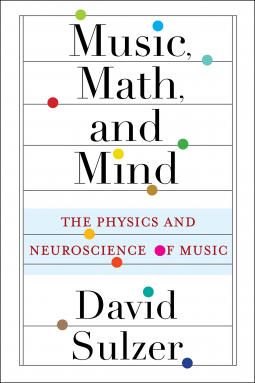
Music, Math, and Mind
The Physics and Neuroscience of Music
by David Sulzer
This title was previously available on NetGalley and is now archived.
Send NetGalley books directly to your Kindle or Kindle app
1
To read on a Kindle or Kindle app, please add kindle@netgalley.com as an approved email address to receive files in your Amazon account. Click here for step-by-step instructions.
2
Also find your Kindle email address within your Amazon account, and enter it here.
Pub Date Apr 27 2021 | Archive Date Aug 04 2021
Talking about this book? Use #MusicMathandMind #NetGalley. More hashtag tips!
Description
This book offers a lively exploration of the mathematics, physics, and neuroscience that underlie music in a way that readers without scientific background can follow. David Sulzer, also known in the musical world as Dave Soldier, explains why the perception of music encompasses the physics of sound, the functions of the ear and deep-brain auditory pathways, and the physiology of emotion. He delves into topics such as the math by which musical scales, rhythms, tuning, and harmonies are derived, from the days of Pythagoras to technological manipulation of sound waves. Sulzer ranges from styles from around the world to canonical composers to hip-hop, the history of experimental music, and animal sound by songbirds, cetaceans, bats, and insects. He makes accessible a vast range of material, helping readers discover the universal principles behind the music they find meaningful.
Written for musicians and music lovers with any level of science and math proficiency, including none, Music, Math, and Mind demystifies how music works while testifying to its beauty and wonder.
Advance Praise
"This is an amazing book. Readers will come back to it again and again for its clear explanations, breadth of content and “listening” advice. It includes a chapter on nonhumans, acknowledging that the sophisticated production and perception of music is not limited to humans. It is accessible to all readers but does not shy away from the direct presentation of science – it gives the reader things that anyone interested in this topic needs to begin to think about. It raises important philosophical questions while allowing the readers to gain the skills to explore these questions for and stops there – giving the reader the chance to pursue or ignore. "
--Susan Savage-Rumbaugh, primatologist and psychologist, specialist in communication by bonobos
"When your band protests “Whaddaya mean ‘dynamics’? I’m playing as loud as I can!”—- turn him onto the solid matter in Music, Math, and Mind. As to Soldier’s confection? A ribald reality check on what makes music matter, and why we should mind. "
--Van Dyke Parks, performer / arranger / producer / composer / lyricist (the Beach Boys)
"Musicians shouldn’t be intimidated by the title of the book by David Sulzer, Music, Math, and Mind: The Physics and Neuroscience of Music. This is a book that any musician or music fan will find both enjoyable and educational. The questions regarding the science, biology and math related to music are made easily understandable and the book is grounded in David’s passion for both creating and enjoying music. At the end, anyone reading this book will have a greater appreciation for the creative spirit and a way to understand music in even deeper ways. "
--Bob Neuwirth, singer-songwriter and record producer
"It is rare that one finds a book where on opening any page, one is drawn to read on and… to read back. Every page has a story, every page a fascinating connection between the universal joy we find in music and some biological or mathematical fact. Here is the place to find out about the way crickets make music, and the McGurk effect! The science comes along gently, never intimidating. Only a neurobiologist who is a master composer and musician could have written this wonderful book! "
--Roald Hoffmann, chemist and writer
"If you think you love music as much as you possibly could, think again. Music, which is so hard to define, and which connects to everything, has yet to reveal every level of its joy to you. This book will help you experience music as an animal, a neural pathway, or a mathematical principle. "
--Jaron Lanier, writer / computer scientist / musician
Available Editions
| EDITION | Other Format |
| ISBN | 9780231193795 |
| PRICE | $30.00 (USD) |
Average rating from 16 members
Featured Reviews
 Claudia D, Reviewer
Claudia D, Reviewer
David Sulzer, the neuroscientist, 'meets' Dave Soldier, the musician, to create one of the most interesting science books I've read so far.
However, as the author states, "this is not a 'pop science' book to be absorbed in a single reading", and he is right. It's very dense, with a lot of technical details, and those chapters are indeed to be reread if your interest is beyond than simple curiosity. It isn't my case, because I don't try to make or even understand music (I can't even sing a single note); I just enjoy hearing it, no matter the structure behind it.
But all the other facts related to sound, how it is perceived, what are the differences between humans and animals hearing, the path music took throughout history, its etimology, and many more, I have found to be extremely appealing.
There is a variety of topics from different fields which are related to sound and interconnected, such as physics, maths, biology, even astronomy, and the connection between them is fascinating.
It is not a light reading, but it compensates in being a very rewarding one for those who are avid for information.
One more thing: there are a lot of recommendations of songs and musical pieces as diverse as possible, from classical music to experimental ones, animal sounds and many, many others. Quite an experience to read about some musical tehnique and then listen to its exemplification.
Enjoy!
 Paul V, Reviewer
Paul V, Reviewer
As the title suggests, this includes a lot of math. But it is accessible/understandable math. It is also highly academic (it is a university publisher, after all). But again, the info is written in an accessible and sometimes entertaining way. Nice use of images and illustrations, too. Highly recommended for those interested in music from a somewhat scientific standpoint. Interesting stuff.
I really appreciate the ARC for review!!
 Reviewer 315097
Reviewer 315097
Thank you to both NetGalley and Columbia University Press for providing me with an advance copy of David Sulzer's nonfiction work, Music, Math, and Mind, in exchange for an honest review.
As a lover of all things music, I find it difficult to shy away from titles that mention the subject. My focus becomes so narrow the second that music enters the picture, that I completely glazed over the word in the title that describes my least favorite subject: math.
Overall, however, the author does a great job explaining difficult concepts in a way that is accessible to readers. He even mentions in the intro that readers should use the table of contents as a guide to skip to chapters that discuss topics they are interested in and not to read the work as if it were a standard fiction novel.
Although anyone can read this book, it definitely leans toward the heavier and drier end of the bookcase. I highly recommend it for musicians and math enthusiasts, but stay clear if you are not interested in any of the topics mentioned in the title.
 Media/Journalist 525255
Media/Journalist 525255
David Sulzer’s book, Music, Math and Mind is a uniquely multifaceted treatise on music.
The author begins with the physics behind sound and why some sounds are more appealing than others which leads to the idea of music. This gem of a book examines the neuroscience behind music - what happens in our brains when we listen to music and even delves into the question of whether music is appreciated by animals! The book is peppered with interesting sources of music to illustrate the points.
Music, Math and Mind will be a delight to anyone with an inquiring mind and a love for natural science or music. Thanks to NetGallery for providing a copy in exchange for an unbiased review.
 Reviewer 725763
Reviewer 725763
I'm 20% into this book, and so far it's been about the mathematics of music—nothing about neuroscience or emotions or how non-human animals experience music. There's no storytelling in evidence, only a dry enumeration of facts. This is not what I expected based on the book description. Since the ARC has no automated table of contents, it's difficult to skip forward to see if it gets more interesting later.
The sidebars interrupt the flow of the text, and there are a lot of them. This is a poor design for books intended to be read in the Kindle app. Maybe the published version is better. In the ARC, the sidebars interrupt the text mid-sentence to talk about something unrelated. I consider this to be disrespectful to ARC readers. This tends to be a problem with university presses—they don't have the formatting skills of the large publishers, and the ARCs are a mess. That's definitely in evidence here.
In the introduction, the author says that no one needs this book, and so far I have to agree. IMO, the early chapters belong in an appendix. The content is encyclopedic, and should not be presented to a lay audience in this manner. The author and publisher should have done a better job of streamlining the subject matter to make sure readers *do* need this book. If you don't think I need this book, then why are you wasting my time?
Thanks, NetGalley, for the ARC I received. This is my honest and voluntary review.
This is a good book for people who love music and math. However, it isn't that suitable for the ones who don't know at least the basic about these two subjects. Although I had a feeling the topics were being explained to someone who doesn't know anything about physics and music, there were time sit seemed like it touched on very complex topics out of nowhere. The parts where the "story" is explained and the parts with the technicalities don't seem to match up that well.. I also though it lacked a bit of storytelling. However, the premise of this book is very interesting. It just lacked orientation.
This book was chock-full of very interesting information. As a musician, I was fascinated by learning more about the math and science behind my craft. The book was dense because of all of the information housed in it, so it is best read in multiple sittings. Sulzer makes the information pretty accessible and understandable. I especially loved the listening suggestions at the end of each chapter. They were very diverse and gave a great opportunity to hear the information from the chapter exemplified. I found this book to be absolutely fascinating!
Readers who liked this book also liked:
Silvia Moreno-Garcia
Historical Fiction, Literary Fiction, Sci Fi & Fantasy


















